Today’s early film was from the Polish director Pawel Pawlikowski, whose previous film Ida won the Oscar for the Best Foreign Language film. His new film, like Ida, is shot in a 4×3 aspect ratio and in black and white. It’s almost a disappointment to sit down in front of one of the biggest cinema screens in the world and find that only half of it is being used. And to add to my aesthetic frustration, one of the first things anyone might teach you about photography is called “the rule of thirds” – where the most important things on the screen – people’s heads, landmarks, horizons, that kind of thing – look best a third of a way along or up the frame; but Pawlikowski choses to put his characters’ heads along the middle of his frame, essentially wasting the top half of an already small frame.
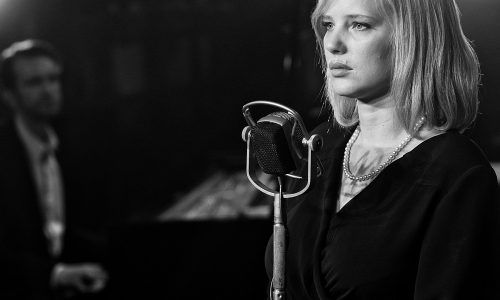
The film itself was a heart-breaking story of mis-matched, ill-starred lovers, beginning in a post-Second World War Poland, where a musician sets up a music school and falls for one of his students. In the years that follows, he defects to the West, but she doesn’t, setting up a decades long relationship, during which the pair are kept apart by politics.
Having just seen the only British film in the competition – yes, you read that correctly, this Polish film about Polish people is in fact part-funded by the BFI – it was appropriate that when the credits rolled, I had a mad dash to the UK Film Centre to interview the Culture Minister Margot James, in Cannes to promote British film-makers and film-making to the World. But in Cannes, there’s no such thing as a mad dash, as two thousand people don’t filter out of a huge cinema with a great sense of urgency. I finally turned up, with a couple of minutes to spare only to find out that she’d been held up at a breakfast meeting.
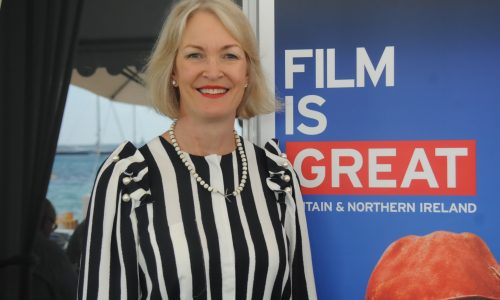
There’s a lot to talk about at this year’s Cannes, from Britain trying to reassure its co-production partners that Brexit won’t have a detrimental effect on the industry to the consequences on film-making generally of the Weinstein scandal. On the first subject, she said Brexit wouldn’t have any effect on the existing tax reliefs, the close-working relationship with our European counterparts would continue, and with immigration being “controlled” rather than stopped, EU workers would still be able to work in the UK Film Industy. “I can’t see anything about Brexit that would affect that adversely.” she stressed, and that was from an MP who voted to Remain. And considering the post-Weinstein world, she said a positive outcome was that the clock could not now be turned back. “We’re now seeing it as a positive force for improving diversity and inclusion across the range, not just for women but for all groups affected by the discrimination, and worse, that has gone before,” insisting that this was one of the top priorities of the industry now. She dismissed the suggestion that the BFI’s diversity strategy – requiring conditions to be met for funding to be claimed – was a box ticking exercise, stressing that they’re recognising potential talent that has been missed and providing a safe environment for bringing that talent forward. “I think it will enhance the creative experience because for too long, people have been kept down for artificial reasons of gender and ethnicity and to that extent, the industry as been denied the pool of talent that has existed out there that hasn’t been able to come forward in the right numbers, so I think it’s good for creativity.” But she stopped short of endorsing Labour’s recent suggestion that the same diversity criteria should apply to the receipt of tax incentives, saying that the industry couldn’t change overnight. “Industry has to be allowed the time to develop the talent and the skills that they need in term of the pipe-line and to turn off the tax relief before industry has time to develop the pipe-line would be a mistake, because then the number of jobs would be seriously adversely affected for everybody.
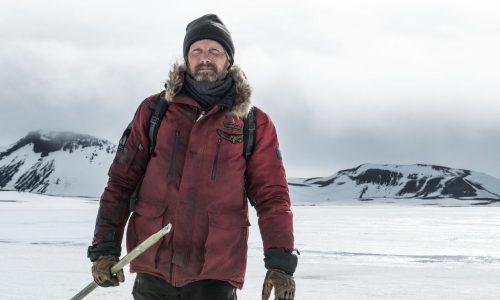
Next it was back to see another film, screening out of competition in the official selection – as Arctic begins, we meet Mads Mikkelsen, stranded alone in the Arctic after a plane crash. We watch as he uses his initiative to find food, keep warm and fight off polar bears. This gripping tale of an attempt to survive is like an icy version of Robert Redford’s recent Cannes hit All Is Lost and joins the cannon of “trying to get to safety against the odds” films including Gravity and 127 Hours. And the odds really are stacked against our protagonist, who can’t even decide whether he’s more likely to make it if he waits in the relative comfort of his plane wreck for help to arrive or whether he should pack up what he can drag and walk back to civilisation. The director Joe Penna effectively paints a picture of determination and resourcefulness as Mikkelsen’s hope alternates with despair in this tense battle between one man and the desolate white wilderness, one of the most inhospitable parts of the world.
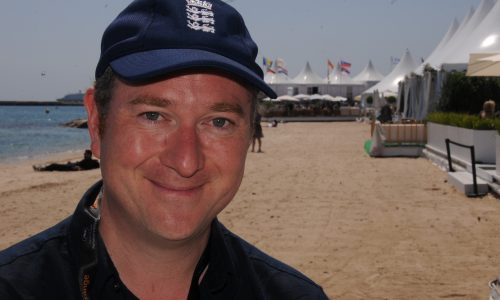
While the Cannes that everybody sees is the high profile selection of films, whose directors and stars get to mount the red carpeted stairs into one of the most prestigious cinemas, under the glare of the world’s press. But at the other end of Cannes, up and coming talent is chipping away at the industry to find a way in – and that way in is often seeking funding for small projects. It was back to the UK Film Centre where young – and, dare I say it, not so young – British talent set up meetings with like-minded people to try to get projects off the ground. Dan March, a comic actor and writer from London, was trying to raise funding for two short films he’s written and hopes to star in. There’s a comedy, The Fontfather – yes, think The Godfather…and fonts – and a drama, called In The Moment, which – like good shorts should – takes the viewer somewhere they weren’t quite expecting. Beside him was Daniel Dixon, a producer just a little further down the line in his career. Off the back of a previous short film, he and his Bristol-based director were now raising financing to develop the same story into a feature. He’d just secured some money from Creative England, one of the public funding bodies in the UK that tries to promote film-makers based outside London; counterintuitively, perhaps, long before such campaigns as #OscarsSoWhite and #MeToo were trying to level the playing field, funding bodies were trying to help film-makers outside the capital.
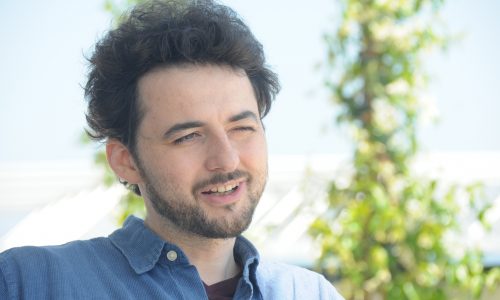
The next stop in my day was an slightly unexpected turn – a friend who works for BBC Arabic wasn’t given a cameraman to film a couple of interviews so he asked me for help. Since one of them was with AB Shawky, the director of Yomeddine, the best film I’ve seen so far, so it was worth skipping a press conference for a one-on-one. It hadn’t occurred to me that since it was for BBC Arabic, the interview was in Arabic, so I can’t even tell you what he said about his film, although I’m assured it was profound. I can tell you that the AB stands for Abu Bakr but given the connotations that name has acquired of late, he goes by AB to avoid controversy. I can also tell you that he seems genuinely modest – when a passing woman interrupted him to praise him for the quality of his work, “You are just want Arabic cinema needs – I love your film, well, I’ve only seen the trailer, but it looks amazing. I hope you win,” she enthused. “It’s enough just to be here,” he smiled. I don’t think I’ll be on technical duties again for a while though, as the audio crackled on the interviewer’s microphone (how was I meant to know that he needed to take his keys out of his pocket!) and the director’s head was a little closely cropped for my friend’s liking.
I started earlier by saying there’s no such thing as a mad dash in Cannes. In fact, I was to prove myself wrong, as I wanted to catch the Jean-Luc Godard film after the Arabic interviews – not because I’d heard good things about it, but because – and even moreso in this new Cannes where the press are the last to see films – all you have to go on is the name of the director and the synopsis provided by the festival. This usually comes in the form of a paragraph summing up the story, but not in the case of the veteran French iconoclast. In the case of Jean-Luc Godard’s Image Book, his film was summed up exactly as follows:
Do you still remember how long ago we trained our thoughts?
Most often we’d start from dream…
We dondered how, in total darkness
colours of such intensity could emerge within us.
In a soft low voice
Saying great things,
Surprising, deep and accurate matters.
Image and wrds
Like a bad dream written on a stormy night
Under western eyes
The lost paradises
War is here
No? Me neither. Even after having seen the film, which is a noisy, montage of images – from classic films and newsreels – coloured or saturated, overlayed with chapter headings, captions, voiceovers in English and French – many of them not translated, sound cutting in and out, it’s an almost impenetrable stream of consciousness with some discussion about the Arab world, but to what end? I’m hoping that a news conference will give me some idea about what on earth I ran about two miles to see, having to navigate around the frustrating security pavement closures, which saw me having to run up and down the road, about half a mile at a time, four times, just to get to a cinema literally on the other side of the door where I had been, minutes earlier. Perhaps the stress, exhaustion and having missed the first three minutes hampered my understanding of what can – at this stage – be described only as the messiest, most self-indulgent film I have ever seen in Cannes. “Everybody’s a philosopher,” the narrator suggests, at one point. Not you, Jean-Luc, if this is anything to go by. I suppose that if you’re Jean-Luc Godard, you can do whatever you like and it’ll still be regarded as a work of genius. Not by audiences though, perhaps; never before have I seen so many people leave a screening before the end; as the credits began to roll, there were huge sections of the cinema already empty – I could have done with that to avoid my stress this morning, when I tried to get out to interview the minister.
